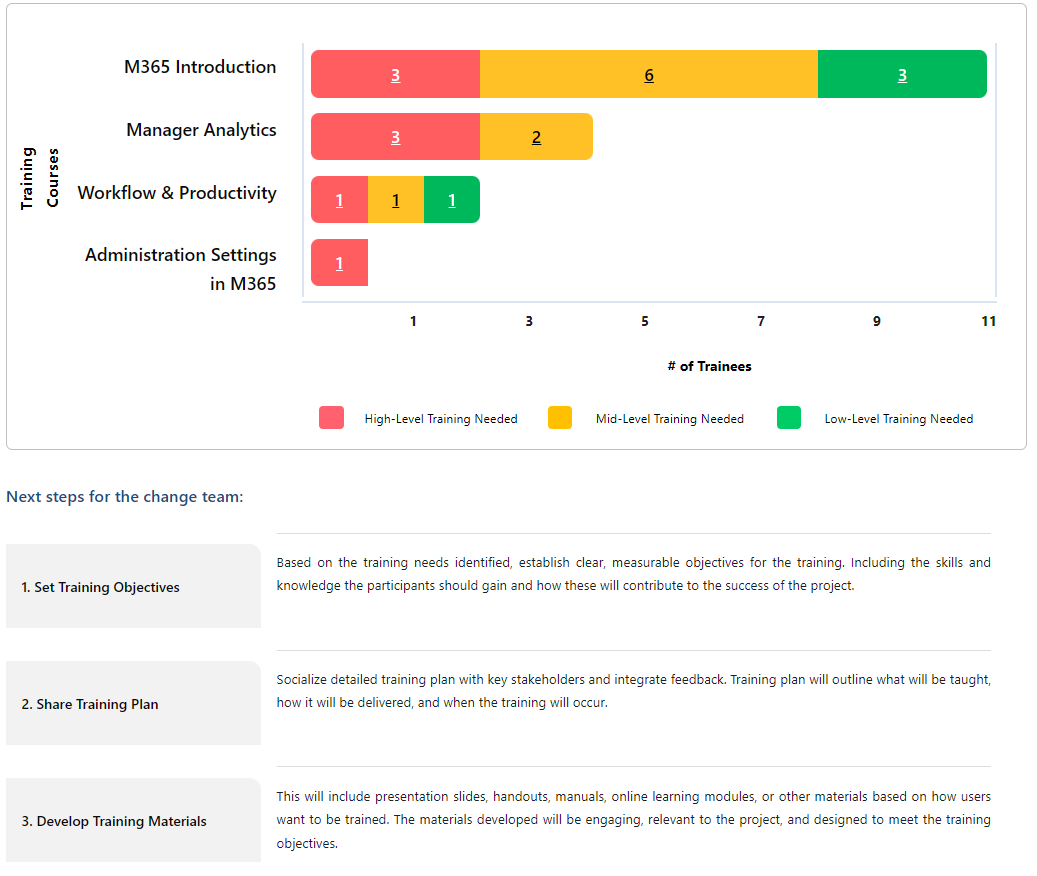Phase Two of OCM | Change Management Plan Development
Everything You Need to Know about the Second Phase of an Effective Change Program
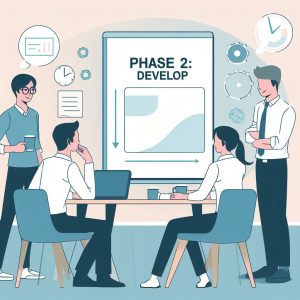
The second phase of change management process steps – the “Develop” phase – emerges as a pivotal juncture where the seeds of transformation begin to sprout into concrete strategies and plans. At this critical juncture, change leaders and teams delve into the intricate task of formulating comprehensive strategies and their overall change management project plan.
It is during Phase 2 that the blueprint for change is meticulously crafted, taking into account the assessments performed during Phase 1 of the change management roadmap. The second phase serves as the architectural stage, laying the groundwork for a resilient and adaptive organizational framework.
Thoughtful and comprehensive planning charts the course for change and serves as a collaborative roadmap, aligning teams, resources, and strategies toward a shared vision. This fosters a smoother and more successful project.
In this article, we’ll give a high-level overview of the OCM Phase 2 deliverables. Including creating a change management plan, strategy, and roadmap.
Change Management Process Guide
The OCMS Change Management Framework has five phases. Each phase includes a set of deliverables that guide you through a successful change management process in project management. These phases include the following:
Phase 1 (the Assess phase) of the organizational change management process involves conducting a series of assessments to understand the scale, scope, and impacts of a change.
Phase 2 (the Develop phase), which is covered below, involves designing and developing a set of change management plans to increase change adoption, increase end-user acceptance, and facilitate stakeholder engagement.
Phase 3 (the Deploy phase) in the change management project plan involves executing the plans created during phase 2. This includes engaging with stakeholders and change champions, tracking readiness, and deploying communications, training, and coaching.
Phase 4 (the Normalize phase) in change management templates is about supporting the impacted individuals and groups post-go live to normalize and sustain the change.
Phase 5 (the Exit phase) in the change management process in project management involves doing those final “housekeeping” tasks to formally close out the project. This includes the final post-mortem report of successes and lessons learned, and knowledge/asset transfers.
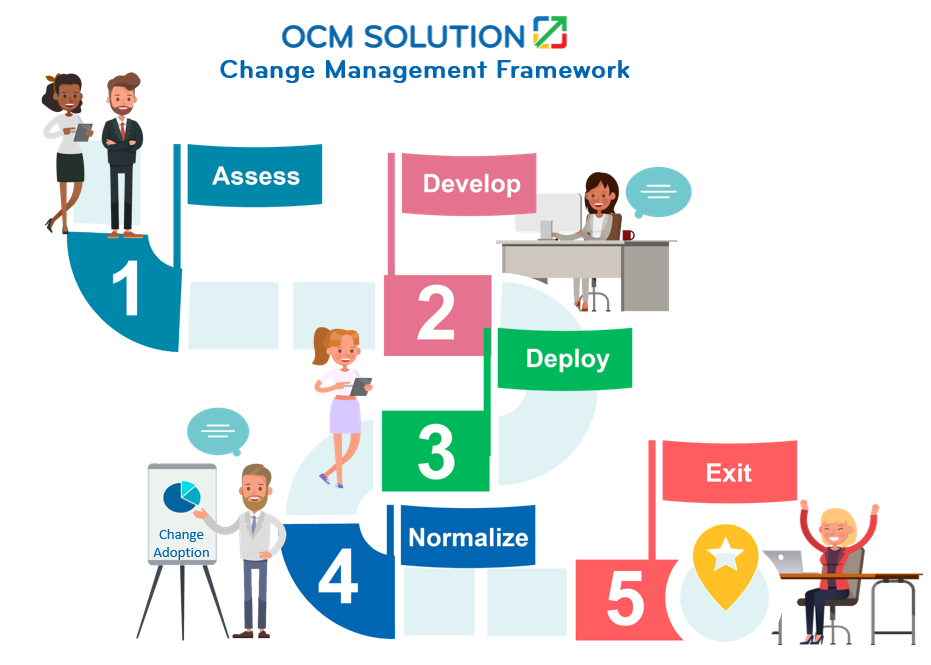
Would you like to read more about the change management plan example described above? You can find a detailed guide for creating a change management plan from end to end by reading more about the OCMS Change Management Framework.
What Drives Your Change Plans?
Your change management plans will be customized to match your change strategy, as well as the level of change management needed for your program.
In general, the level of change management planning that is needed will be based on the scale, severity, and impacts of the change, as well as how ready each impacted group is to transit from their current state of working to the new future state. Another key factor that drives the scale of your change management plans (engagement plan, change management communication plan, champions network plan, change management training plan, etc.) includes the level of existing receptiveness or resistance to the change.
All of these mentioned variables would have been identified during the first phase when you conducted your change impacts, readiness, audience, stakeholder, and other assessments. Click here to read more about conducting your change assessments.
Do you have any questions about change management templates, change management process examples, or change management roadmaps? Please reach out and let us know.
OCM Phase 2 Deliverables: Sample Change Management Plan Checklist
In the realm of change management’s Phase 2, crafting an organizational change management plan and strategy is akin to orchestrating a symphony of organizational transformation. Utilizing a checklist in this pivotal phase becomes a strategic imperative, akin to a conductor’s score ensuring harmony among diverse elements.
A well-structured checklist acts as a systematic guide and change management process example, ensuring that no crucial aspect is overlooked during the intricate process. It serves as a reliable tool for change leaders, helping them navigate the multifaceted landscape of change management deliverables with precision, thoroughness, and accountability.
From stakeholder engagement planning to change management communication plan formulation, a checklist becomes the linchpin, promoting organization and coherence in the creation of a blueprint that aligns people, processes, and objectives.
The checklist, in essence, transforms the complex task of Phase 2 deliverables into a manageable and methodical journey, fostering confidence in the execution of change initiatives and setting the stage for success.
OCMS Portal Change Management Templates – Project Checklist by Phase
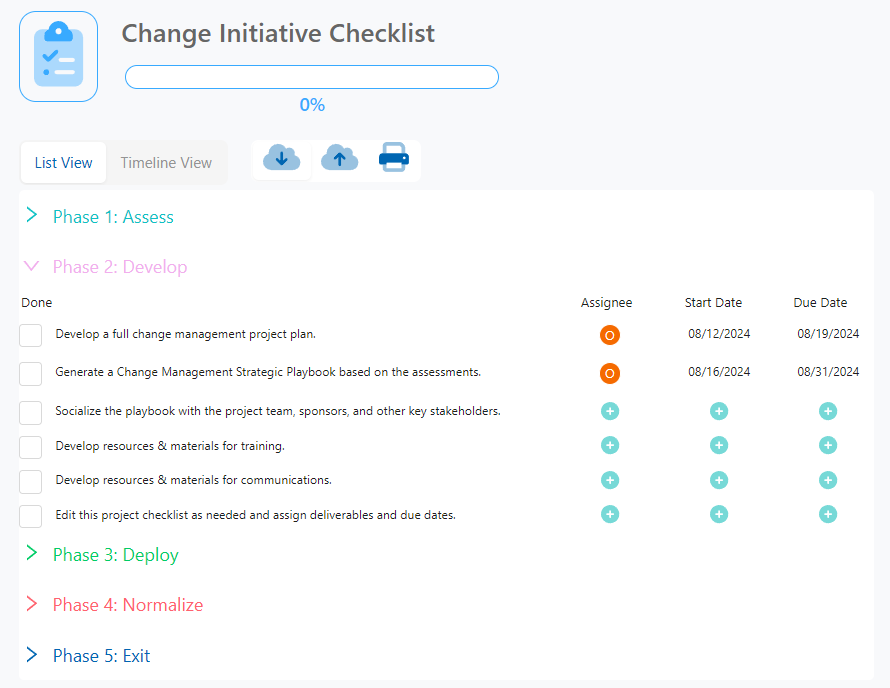
The OCMS Portal all-in-one change management software includes a pre-populated organizational change management plan example checklist to give you a head start on your OCM tasks. You can try the platform out for free – no credit card needed. Sign up for a free trial below.
The Change Management Process Steps – Phase 2 Overview
Below is a change management process example for phase 2, the development phase of OCM. This sample change management plan comes from the OCMS Change Framework, which you can read in more detail here.
Click below for a quick overview of each of these change plans and deliverables. Also included below are links to more detailed pages for templates, samples, and procedures for completing these plans.
- Create Strategic Change Plan (OCM Strategic Playbook)
- Create OCM Roadmaps
- Develop Detailed Change Management Plan, including:
1. Create Strategic Change Plan (OCM Strategic Playbook)
The strategic playbook deliverable is where you plan out a strategy of what should be done based on the assessments performed in Phase 1. This is a precursor to your overall detailed organizational change management project plan. You’ll socialize the OCM playbook with key stakeholders, sponsors, etc. to gather feedback and then fold that feedback into your overall change management plan… read more.
Change Management Templates – OCM Strategic Playbook.
Looking for free change management templates for a strategic playbook? Create a Free Account with OCMS Portal to access these and hundreds of other free downloads.
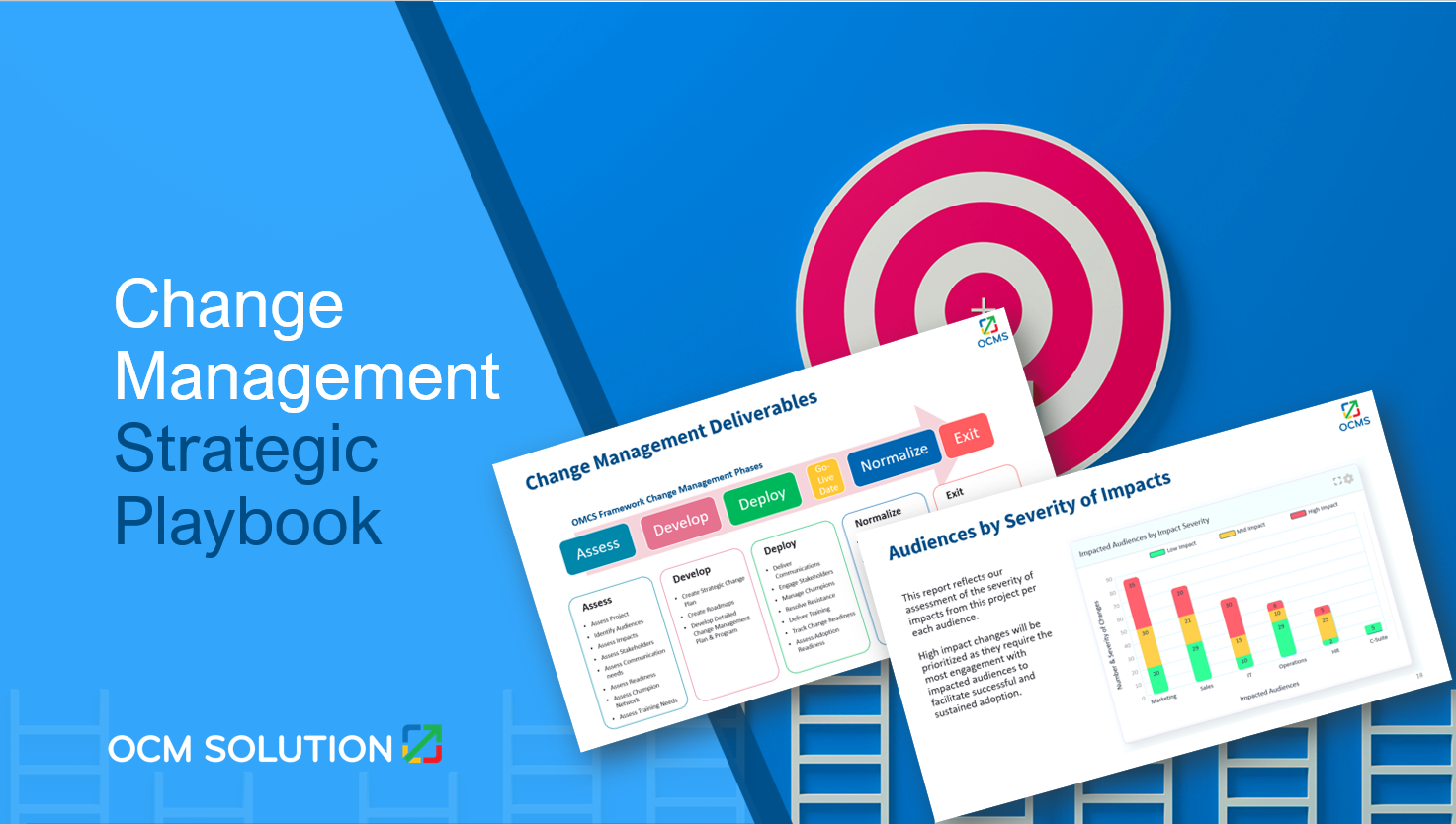
Do you have questions about a sample change management plan, change management training plan or change management process guide? Please reach out. We can help!
2. Create OCM Roadmaps
In the planning phase of the change management process in project management, crafting meticulous change management roadmaps emerges as a cornerstone for success. By delineating key milestones, timelines, and critical tasks, change leaders can establish a clear trajectory for implementation.… read more.
Creating Change Management Roadmaps.
3. Develop Detailed Change Management Plan
The most time-intensive of the change management process steps in Phase 2 is developing a detailed change management plan. This is the linchpin in the transformative journey of any organization. This comprehensive guide serves as the blueprint for navigating the complexities of change, outlining specific strategies, timelines, and responsibilities.
Additionally, encompassed within the overall change management project plan are several distinct plans for various areas of your change management deployment.… read more.
Creating a Change Management Plan.
Change Management Plan Example from OCMS Portal
Sample Change Management Training Plan
OCMS Portal change management software provides you with a detailed change management plan for your project automatically. The organizational change management process plan is based on all the assessments done in phase 1. Learn more about OCMS Portal here.
Keep reading to learn more about the other plan components of the overall change management plan example.
Change Management Communication Plan
To effectively communicate with stakeholders and all end-users that will be impacted (or potentially impacted) by a transformational change, you should utilize a wide range of communication channels. Depending on the global or regional scale of your targeted audience, your communication channels should include newsletters, roadshows, leadership 3×5, blog, social media, emails, videos, surveys and …. read more.
Developing Your Change Management Communication Plans.
Engagement Plan – Stakeholders
In order to effectively support the successful implementation of a project, key leaders and managers (critical stakeholders) often need coaching on best change management practices. They might also need to change management resource support from you throughout the duration of the program implementation to help them more effectively perform their roles as sponsors of the change.
A stakeholder & sponsorship plan needs to be developed for your program, which you will use to build commitment, sponsorship and increase support of the program across impacted groups or target audiences…. read more.
Developing Your Stakeholders & Sponsors Plan
Engagement Plan – Business Units
To increase the successful implementation of a program change, business units and end-users impacted by the change need to accept, embrace and adopt the new processes and solutions.
A key function of effective organizational change management is to engage these impacted individuals to help them transition from their current state to a targeted future state. To increase the success of your engagement activities, you should have an engagement plan for engaging with impacted business units…. read more.
Developing Your Impacted End-Users Engagement Plan
Resistance Management Plan
A resistance management plan is an extremely important change management plan for large, complex projects, as well as for small or medium projects that are facing or expected to face resistance. Mitigating resistance increases the probability that end-users will embrace and adopt the change.
Whenever there is a change, there is always resistance, and so do not be surprised by it! Even if the change initiative presents a wonderful improvement to key problems that have been plaguing impacted end-users, there will still be some level of resistance to the change…. read more.
Developing Your Resistance Management Plans.
Change Management Training Plan
Analyzing, designing, developing, testing, and executing an end-to-end training program is one of the most vital deliverables you need to implement to provide impacted end-users with new skills and behaviors. There is a wide range of training methodologies that can be applied to developing and implementing your training program plan. Click here to read more.
Developing Your Change Management Training Plan.
Coaching Plan
Whenever we talk about coaching, from organizational change management or program management perspective, we are referring to coaching that is provided to key managers to help them perform their roles as change agents.
Most managers and leaders are great at performing their normal day-to-day operational job functions, but they don’t often have the right expertise, tools or support to be great change agents.
In order for a program, project, initiative or change to have a higher level of success, managers and leaders need to be active sponsors and supporters of the change, and they need to understand best change practices so they can be more efficient in their role as key change agents. Developing an end-to-end coaching plan allows you to….. read more.
Developing Your Coaching Plans.
Change Adoption Tracking & Measurement Plan
While project management involves planning, designing, developing, and rolling out solutions, organizational change management involves working with impacted end-users and stakeholders to build acceptance and adoption of the new solutions. As such, when it comes to tracking key performance indicators (KPIs) and metrics, you will need to track … read more.
Developing Your Change Adoption Tracking Plans.
Phase 2 Change Management Process Example Conclusion
In the intricate landscape of change management, the planning phase, particularly the development of comprehensive strategies and plans, stands as a crucial juncture where aspirations for transformation materialize into actionable roadmaps.
Whether through the creation of strategic playbooks, change management roadmaps, or detailed plans, this phase is emblematic of meticulous foresight and adaptability. As organizations navigate the dynamic challenges of change, these well-crafted plans become more than mere documents—they become the instruments through which leaders orchestrate a harmonious transition.
FAQ – Sample Change Management Plan
What is a change management process in project management?
Change management is the process of working with the individuals and groups being impacted by changes from a particulate project initiative to help them successfully adopt those changes.
What are the 5 phases of the change management process steps?
In the OCM Solution Change Management Framework and organizational change management plan, the five phases of the change management process are:
Phase 1: Assess
Phase 2: Develop
Phase 3: Deploy
Phase 4: Normalize
Phase 5: Exit
What's involved in the second phase of a change management roadmap?
The second phase of an organizational change management process guide is about using the information from the assessments done in phase 1 to formulate a change management strategy, roadmap, and plan.
Note: Content on OCM Solution's ocmsolution.com website is protected by copyright. Should you have any questions or comments regarding this OCM Solutions page, please reach out to Ogbe Airiodion (Change Management Lead) or the OCM Solutions Team today. OCM Solution was previously known as Airiodion Global Services (AGS).
External Sources: stock.adobe.com





